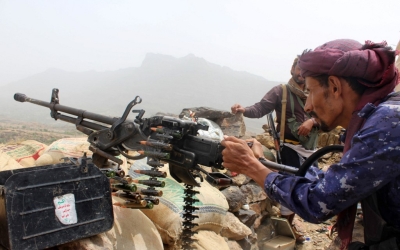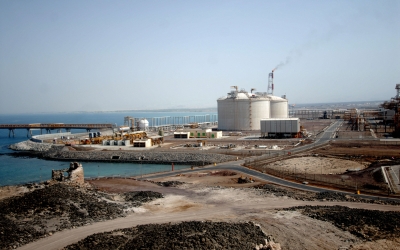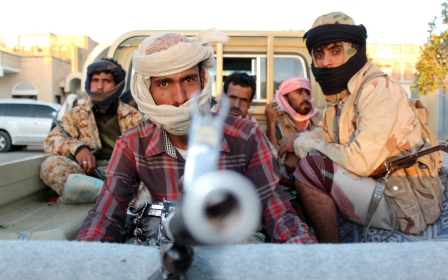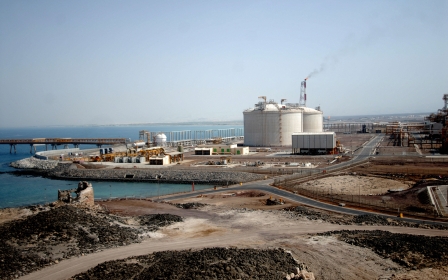Yemen: Mysterious death of a visiting expatriate sparks uproar

Originally from Yemen's Dhamar province, Abdul-Malek al-Sanabani left the country for the United States seven years ago, before a Saudi-led coalition intervened in the budding conflict between the government of Abd Rabbuh Mansour Hadi and Houthi rebels.
He returned to Yemen this month to visit his family, but barely a day after his arrival, Sanabani was dead.
On Wednesday, southern separatist forces in Yemen's Lahij province announced that they had arrested a suspected member of the Houthi rebel movement while he was travelling with thousands of US dollars from Aden towards Houthi-controlled areas in the north.

The news, published on websites supporting the UAE-backed Southern Transitional Council (STC), was accompanied by a photo allegedly showing Sanabani with his hands tied behind his back on the bed of a military vehicle.
There were conflicting reports of Sanabani's whereabouts. One website said he was being detained in a prison in Amran for "preliminary investigation," others claimed he was jailed in an Emirati-backed facility in Aden.
Some Arabic reports said men had left him at the Masafi hospital in Aden.
Upon seeing Sanabani's photo in the news, his relatives began a frantic search which led them to the southern port city.
But by the time one of his cousins arrived from Dhamar on Thursday, Sanabani was nowhere to be found in the Emirati-backed detention centres in Aden.
After asking forces manning checkpoints in the city, the cousin was finally pointed towards the Republican hospital, where he found Sanabani dead.
In an audio recording shared on social media, the cousin said that Sanabani's body bore marks of torture, and the young man had been shot in the back and leg.
The case has sparked outrage in Yemen, adding to widespread concerns about unchecked violence by some militias in the country and further highlighting the dangers faced by Yemenis seeking to travel across the country in dangerous circumstances.
Calls for accountability
News of Sanabani's death has also triggered condemnation from the internationally recognised Yemeni government, human rights activists, and members of the Yemeni community in the US, as well as from those who lead the tribe the suspected killers belong to.
Local pro-STC news reports said Sanabani had been taking photos of military sites when the Ninth Strike Force Brigade, which is part of the STC, tried to arrest him, adding that Sanabani reportedly tried to evade arrest.
The published photos, which clearly show the faces of the fighters who detained Sanabani, have prompted lawyers and activists to call for justice.
"If there is an honest and effective judiciary, legal institutions that pursue the killers can request their extradition or issue a compulsive order to arrest them, prosecute them, and bring them to justice," Huda al-Sarari, a lawyer and human rights activist tweeted.
"Unfortunately the disruption of the judiciary contributes to the exacerbation of crimes against innocent citizens, as well as the yellow journalism that publishes justifications for the killers."
On Friday, the Ninth Strike Force Brigade issued a statement denying that its fighters had killed Sanabani, claiming that he had been grievously injured in a car accident and that members of the brigade had taken him to a hospital in Aden.
Sanabani's cousin said he had been told the same story on Thursday, but that the marks he saw on his relative's body told another story, as he called for the alleged killers to face accountability for their actions.
Leaders of the al-Sabaihah tribe, of which the suspected killers are members, publicly denounced such behaviour and called on the STC to put the men on trial.
While expressing support for a legal investigation into the case, the STC has nonetheless sought to paint Sanabani's death as an isolated incident.
"It is shameful to hear what happened to the passenger who was abducted from the checkpoint, but this is individual behaviour by some soldiers," Ahmed al-Subaih, a supporter of the STC, told Middle East Eye.
He stated that the STC can bring in the accused soldiers in minutes, stating that many civilians were extorted under the pretext of being "suspected Houthi".
"We oppose this, and we demand fair trial of the accused soldiers who were responsible for the checkpoint at that time on Wednesday," Subaih added. "Even if the Ninth Strike Force Brigade says it was a car accident, accused people should go to trial and let the court decide the reason of death, otherwise this accusation will lead to more victims."
A dangerous route
Mohammed al-Nashri, a leader of the Ninth Strike Force Brigade, confirmed that they arrested Sanabani and sent him to the brigade's detention centre in Aden for investigation.
But locals told MEE that forces regularly stop travellers in the area, regardless of circumstances.
"The military checkpoints of the STC in Lahij don't respect passengers, and they always stop passengers from the north and sometimes abduct them," Mohammed, a bus driver who transports passengers from Aden to northern areas, told MEE on condition of anonymity.
'Those checkpoints inspect everything in buses and cars, and if they find a passenger with a lot of money, they will definitely abduct him'
- Mohammed, bus driver
"Those checkpoints inspect everything in buses and cars, and if they find a passenger with a lot of money, they will definitely abduct him."
Mohammed said he himself had been stopped on several occasions and had to pay a bribe to be allowed to continue his journey.
"I advise my passengers not to take huge amounts of money with them, but it seems that Sanabani wasn't aware of this and they abducted him for the sake of his money," Mohammed said.
After more than six years of war, the airport in the city of Sanaa has long been closed to international flights, leaving only the Aden and Seiyun airports open in the south.
Yemeni expatriates have little choice when returning home but to fly into the south and make the dangerous journey by land towards the northern provinces.
"The closure of the Sanaa airport has caused a lot of suffering for people from the north, as we aren't accepted by southern forces in the southern checkpoints," Ashraf Hamid, a resident of Sanaa, told MEE.
"The only solution to end the humiliation and insults we receive from southern forces is to open Sanaa airport so we can travel from Sanaa, which accepts all Yemenis."
Middle East Eye delivers independent and unrivalled coverage and analysis of the Middle East, North Africa and beyond. To learn more about republishing this content and the associated fees, please fill out this form. More about MEE can be found here.





